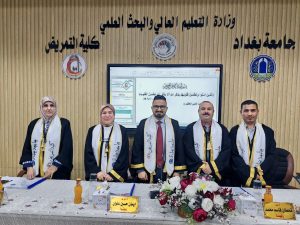The College of Nursing at the University of Baghdad discussed a master’s thesis entitled “The impact of disease-related psychological distress on quality of life and disease activity in patients with systemic lupus Eratosthenes.” The thesis was presented by student Ali Hussein Khalifa, supervised by Assistant Professor Dr. Wafa Abdul Ali Hatab, and discussed in the college’s main hall.
It aimed to assess the impact of stress on quality of life and disease activity in patients with systemic lupus Eratosthenes and to explore demographic associations. The thesis included important research findings, and the study showed a statistically significant inverse relationship between stress and quality of life, indicating that increased stress is associated with a decrease in patients’ quality of life.
The results reported a statistically significant association between stress levels and disease activity, with stress scores explaining 20% of the variance in disease activity. Smoking was positively associated with stress measures, while disease activity levels were positively associated with lower income and use of psychiatric medications.
The study reached a key recommendation emphasizing the need for medical care provided to patients with systemic lupus Eratosthenes to include effective stress management strategies, such as mindfulness techniques and cognitive behavioral therapy. This aims to reduce disease activity and improve patients’ overall quality of life. Researcher Ali Hussein Khalifa received an “excellent” grade for his thesis. This study is directly aligned with the Sustainable Development Goals, specifically Goal 3: “Good Health and Well-being,” Goal 4: “Quality Education,” and Goal 10: “Reduced Inequalities.”










